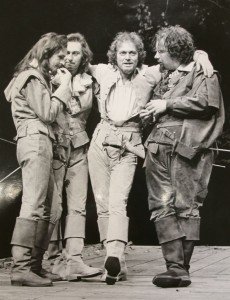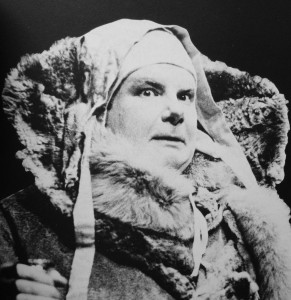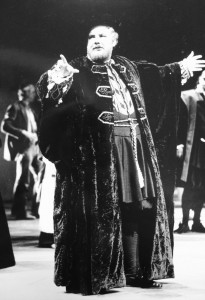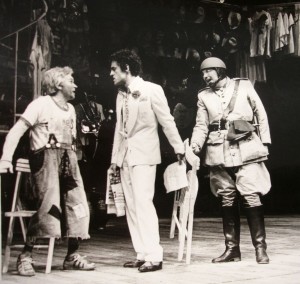One evening last week, at 7.28pm, just before performances were due to begin, all the theatres on Shaftesbury Avenue in London simultaneously dimmed their lights. This traditional tribute to an actor who has recently died is carried out only rarely, but then Richard Griffiths was an actor who was held in unusual respect and affection.
Most people will remember Griffiths from films such as the Harry Potter series, The History Boys, or Withnail and I. But he was also a superb stage actor.
Griffiths got his first major breaks at the Royal Shakespeare Company in the 1970s. He started off playing small comic roles like Peter in Romeo and Juliet in 1976 but quickly gained attention. After only a year or so he was cast as Bottom in A Midsummer Night’s Dream, and he might have expected to follow this with other rustic comics like Dogberry in Much Ado About Nothing.

Ian Charleson, Paul Whitworth, Michael Pennington and Richard Griffiths in Love’s Labour’s Lost, 1978
So when it came to casting Love’s Labour’s Lost he could have been seen as Constable Dull, or Sir Nathaniel: casting him as the King of Navarre was inspired. Griffiths was every inch the awkward king, rather shy, who had somehow managed to persuade his dashing trio of friends to join him in years of monk-like study. Irving Wardle wrote “Richard Griffiths as the King of Navarre…is a tubby, easily embarrassed monarch who is plainly going to ground because he feels more at home with books than people, especially women. As a result, it is unusually enjoyable when the play proves him wrong”. Matching him was the Princess of France, also bespectacled and surrounded by more extrovert friends. For once it was their romance, rather than Berowne and Rosaline’s that was at the play’s centre, giving it real heart.
In London he played a number of non-Shakespeare roles returning to Stratford for two major ones in 1983: Henry VIII and Ben Jonson’s Volpone, in the plays of the same name.
In Howard Davies’s Brechtian production, Griffiths’ Henry played against the popular Holbein image, demonstrating that Shakespeare’s king is a more subtle portrayal. Irving Wardle described him as “not the peremptory bull-like aristocrat of legend, but a slow-moving, temperamentally withdrawn figure who at first seems to be at the mercy of stronger surrounding personalities. When he hears evidence, he sits resting his head in his hands; when he arbitrates, he seems to be submitting to forces beyond his control”.
In Volpone, at the RSC’s studio theatre The Other Place, I remember Griffiths playing a character much closer to those he was to take later, manipulating others and putting on an act with a gleam in his eye. Michael Billington described him as “a laid-back grandee who gets a big kick out of impersonation. At the first hint of a visitor, he whips out his make-up box, speckles his face with skin-rash, and lets his right hand go feebly palsied”.
But my strongest memory of Richard Griffiths on stage is his performance in Trevor Nunn’s musical version of The Comedy of Errors which I saw repeatedly in London in 1977, and which was subsequently filmed. The Officer is one of the shortest roles in the play, with only a handful of lines. Nunn and his designer John Napier chose to play on Griffiths’ size to turn this tiny role into something more.
He was made immediately notieceable in his costume as a motorbike outrider complete with comic trousers and a metal pudding-basin of a helmet clamped onto his head. As the confusions of the play multiply the officer is called on to arrest Antipholus of Ephesus. Here, he fixed one handcuff to Antipholus, the other to himself, only to find that he had also bound a folding chair, the source of much physical comedy. When Antipholus was claimed by his wife and the conjuror Doctor Pinch, Griffiths challenged them with the simple line “He’s my prisoner”. Every time I see a production of The Comedy of Errors I always wonder why this line goes for nothing. Griffiths’ mournful delivery made it one of the best jokes of the evening.
For the final scene, when all the errors of the evening are resolved, Griffiths was back. As the Duke’s sidekick he now appeared in full Greek ceremonial dress: short skirt (which had been stiffened into something more like a ballet tutu), white tights, pompoms on his shoes. Without a word he stole the scene, being goosed by a potted plant into which he had inadvertently reversed. And yet he never unbalanced it. The Morning Star called him “clumsily delicate” and Robert Cushman commented that he was “both the victim and the beneficiary of much invention”.
And it was that modest generosity, along with his talent, which might explain why he was so loved both within the profession and by theatregoers. What might not be well known was that Griffiths lived in Stratford-upon-Avon for many years before moving to a nearby village where he generously lent his support to community events.





Lovely piece, Sylvia – I do wish I’d seen him at the RSC. Appropriately his funeral took place this morning at Holy Trinity so I hope there was a good turn-out from the RSC.